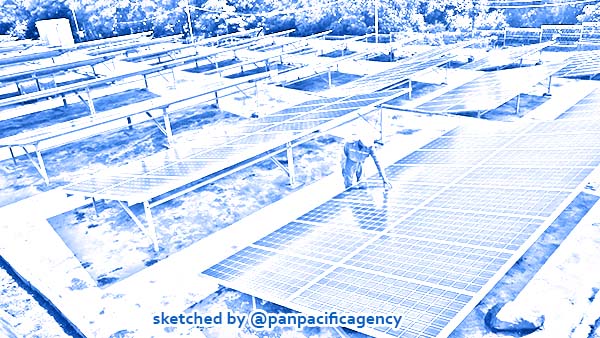Indian power project replaces Chinese venture in Sri Lanka’s northern islands

A worker inspects solar panels at a 600 kWp solar power plant on Gili Trawangan Island in Lombok, West Nusa Tenggara, in this undated photo. A think tank and the government are working on an ambitious billion-dollar plan to recover Indonesia’s virus-ridden economy by installing thousands of rooftop solar panels. (PLN/PLN). Sketched by the Pan Pacific Agency.
NEW DELHI, Mar 29, 2022, The Hindu. India will set up hybrid power projects in three Islands off Jaffna, effectively replacing the Chinese venture cleared by Colombo last year, The Hindu reported.
The MoU for the project was among those signed during a meeting between visiting External Affairs Minister (EAM) S. Jaishankar and his Sri Lankan counterpart G.L. Peiris late on Monday. It is the third Indian energy project coming up in Sri Lanka’s north and east, after the recent agreements for National Thermal Power Corporation’s solar venture in the eastern Sampur town, and the Adani Group’s renewable energy projects in Mannar and Pooneryn in the north.
In January 2021, Sri Lanka’s Cabinet decided to award renewable energy projects in Nainativu , Delft or Neduntheevu , and Analaitivu islands to Chinese company Sinosoar-Etechwin, following an Asia Development Bank-backed competitive bid. India was quick to express concern to the Sri Lankan side over the Chinese project coming up in the Palk Bay, barely 50 km off Tamil Nadu. New Delhi offered to execute the same project with a grant rather than a loan. Unable to pick a side for over a year, Colombo kept the project in suspension, apparently putting off China. In a recent press briefing, the Chinese Ambassador in Colombo voiced rare criticism over the projects being interrupted for “unknown reasons”, and said it sent out the wrong message to potential foreign investors.
Meanwhile, India and Sri Lanka have also agreed to set up a Maritime Rescue Coordination Center (MRCC), signalling greater defence sector collaboration between the neighbours. The initiative, involving Bharath Electronics and a $ 6 million Indian grant, obtained Cabinet approval last week. India will also help develop fisheries harbours in Point Pedro, Pesalai, and Gurunagar in the Northern Province, and Balapitiya, south of capital Colombo, in addition to supporting schools in the southern Galle district with computer labs and smart boards, extending a grant for Sri Lanka’s Unique Digital Identity project, and collaborating in diplomatic training, a statement said.
Gotabaya-TNA talks
On developments in regard to Sri Lanka’s long-pending Tamil question, India has welcomed the recent talks between President Gotabaya Rajapaksa and the Tamil National Alliance (TNA), the largest grouping of legislators elected from the north and east.
In a separate statement issued hours after Mr. Jaishankar’s meeting with a TNA delegation on Monday, the Indian High Commission said the Tamil leaders briefed the visiting EAM about their meeting with Mr. Rajapaksa on March 25. “They conveyed that the issues of release of political prisoners, land utilisation, missing persons, 13th Amendment implementation and diaspora investment were discussed in the meeting,” the statement said.
Mr. Jaishankar discussed the same when he called on the President, the statement said, without mentioning the specifics of the discussion. The EAM has so far not publicly commented on the Tamil question or power devolution during this visit, while a tweet after his meeting with the TNA said he “discussed” the realisation of Tamil aspirations for equality, justice, peace, and dignity. During his last visit in January 2021, he convyed a strong message to the Sri Lankan leadership that it was in “Sri Lanka’s own interest” that the expectations of the Tamil people are fulfilled. “That applies equally to commitments made by the Sri Lankan government on meaningful devolution, including the 13th Amendment,” he told a Colombo media conference then.
The official statement issued on Monday said Mr. Jaishankar welcomed “the positive developments” regarding the issues on the Government-TNA agenda, adding that he emphasised that the Government of India was “consistently supportive” of the realisation of the aspirations of the Tamils of Sri Lanka for equality, justice, peace and dignity within the framework of a united Sri Lanka, in addition to its ongoing development partnership in the region.
In last week’s meeting, the first between the TNA and Mr. Rajapaksa since his election in 2019, the government made fresh assurances to address long-pending Tamil concerns, promising to look into the release of long-detained suspects arrested under Sri Lanka’s widely-criticised terrorism law, land grabs by state agencies, enforced disappearances, and development of the north and east. However, the government postponed discussing the TNA’s core demand for a political solution through a new constitutional arrangement devolving more powers to the provinces. Mr. Jaishankar encouraged the TNA to pursue those matters that the government has agreed to address, rather than wait only for the new constitutional settlement that may take time, sources present at the discussion said.
The EAM also met Fisheries Minister Douglas Devananda, and discussed the fishermen’s conflict and power devolution, the Indian High Commission’s statement said.